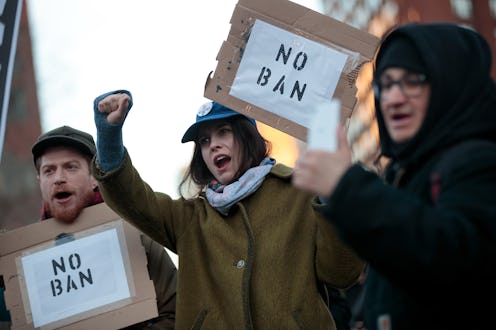News
Hawaii Files Challenge Over Travel Ban's "Bona Fide Relationship" Definition

On Thursday, the state of Hawaii took President Trump's travel ban to court once again, challenging the administration's criteria for determining whether foreign citizens from six Muslim-majority countries allowed entry to the United States. The Supreme Court ruled that the administration can only turn away travelers from those countries if they lack a "bona fide relationship" to someone already in the country, and Hawaii is now asking a U.S. District Court judge in Honolulu to clarify what exactly that phrase means.
On Thursday, the New York Times reported that the State Department is using specific criteria to determine what constitutes a "bona fide relationship." Parents, children, siblings (including half- and step), children-in-law and parents-in-law of people in the United States will all be considered sufficiently close to exempt them from the travel ban, while nieces, nephews, aunts, uncles, grandparents, fiancés and siblings-in-law will not.
Hawaii filed an emergency motion with the U.S. District Court on Thursday afternoon, about an hour before the modified travel ban was to take effect. It argued that the district court should clarify that "bona fide relationships" does include grandparents, fiancés, and the other varieties of family member that the Trump administration is not exempting from the ban. Hawaii's motion also explicitly requests that refugees bearing these relationships to people in the United States.
Although the travel ban was officially implemented on Thursday evening, different government websites give conflicting information as to who is and isn't covered under the ban. The State Department's website says that, contrary to the Times' report, fiancés are considered "bona fide relationships," while the Department of Homeland Security's website makes no mention of fiancés in its section on who is exempt from the ban.
Trump issued the first iteration of his travel ban in January. It banned citizens of Syria, Sudan, Somalia, Yemen, Iran, Libya, and Iraq from entering the United States, even if they were lawful permanent residents of America. But that policy was blocked by several federal courts days after it was implemented, and so Trump signed a revised version of the order in March that exempted Iraqi citizens and lawful permanent residents from the ban.
Several courts blocked that version of the ban from taking place as well, but on Monday, the Supreme Court ruled that the administration can implement a limited version of the revised ban, so long as people with a "bona fide relationship" to a person or entity in the United States are exempt from it.
In addition to requesting that the administration expand its definition of "bona fide relationship," Hawaii's emergency motion also requests that refugees who've been given guarantees of admittance to the United States by government agencies be allowed to enter the country.